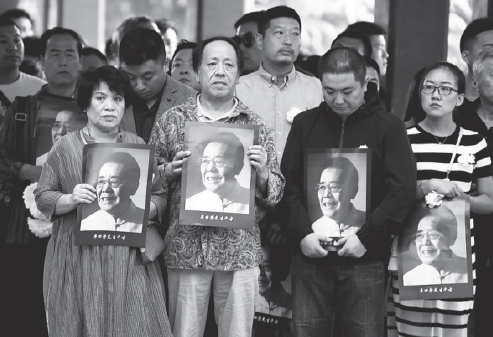 |
|
A farewell ceremony for Shan Tianfang is held in Beijing on Saturday. Shan's interpretations of stories appeal to audiences of all ages. CUI JUN/FOR CHINA DAILY |
"For example, the stories of loyal and law-abiding officials' fight against evil and corruption in society, and dauntless folk heroes' helping poor people, symbolize the virtues of loyalty, integrity and courage."
One of Liu's students, Wang Fengchen, 38, also performed in the show in Beijing to pay tribute to Shan.
Born in Heze, Shandong province, Wang not only performs pingshu but has written material for the stories since 2005.
His parents and grandparents listened to the stories, exposing him to the art form when he was a child.
"At the time, I listened to pingshu stories on radio stations. I liked imitating the artists' voices and repeating the stories on my own," said Wang, who started to learn the art form with Liu in 2006.
"The pingshu artists' performances are as amazing as today's superhero movies. As a young boy, I was fascinated with and inspired by those stories. Those tales, especially the heroes in war stories, inspired me to establish my own moral guidelines."
Radio is one of the ways in which pingshu has reached audiences, and in the 1970s and '80s such shows were very popular.
Elderly people would sit in comfortable bamboo chairs to enjoy the stories while sipping tea. Students would go home at noon to listen to them while having lunch. Taxi drivers would stay tuned to the radio for the shows for a whole day.
A section of a story lasted for half an hour and was usually broadcast three times a day. Performers such as Shan, Lian Liru and Tian Lianyuan were popular among fans.
Liu Daming, 36, a Beijing native and civil servant, said: "I was introduced to pingshu when I was about 8 years old. My grandfather and my father listened to shows on the radio, and pingshu became a significant part of my life-on my way to school, during my lunch break and before I went to bed.
"I am impressed by the artists who have to memorize passages sometimes hundreds of thousands of words long. They also have to incorporate the origins of certain customs, the backgrounds of each character, the related history, geography, and other enchanting aspects of the stories they tell."
Liu also goes to watch live shows that feature young artists, especially Wang Yuebo, who not only performs old tales but also invents new material. Paying just 30 yuan ($4.35) for a ticket, he often has a pleasant afternoon watching these shows.
Liu said: "No other performers support him, nor does he use any multimedia platforms to add color to the stories during his 90-minute performance. He just tells the story while adding a humorous and vivid analysis of the characters."
Like some other traditional Chinese art forms, such as xiangsheng and calligraphy, pingshu requires years of training, usually through a long apprenticeship with a master.
Most important, the artists must passionately devote time, effort and talent to their work. They need to understand the morals of the stories, translate them into their own words and then comment on them.
However, the art form faces a threat from the challenges posed by modern types of entertainment. There are fewer places to watch performances and some artists have switched to other occupations because it is hard to make a decent living.
Wang Fengchen said some young performers are trying to keep pingshu alive and up to date by reinventing it with the inclusion of topical jokes and satire.
Liu, his teacher, has been recording performances at China Central Television, taking in one new work each year.
Thanks to modern technology, professional performers can now record their stories online so that more people can access their works.
One of the most popular podcast platforms is the app Himalaya FM. When Shan Tianfang died, it included 69 works performed by him on its pingshu channel.
Last year, Beijing Vocational College of Opera and Arts launched a pingshu major, including the art form in the academic system for the first time. Wang Fengchen is co-writing teaching material for the major, which he said will attract eight to 10 students a year from around the country.
"The younger generation is lucky to have many options for entertainment, such as computer games, television and movies. But I still I enjoy pingshu and these old tales," he said.